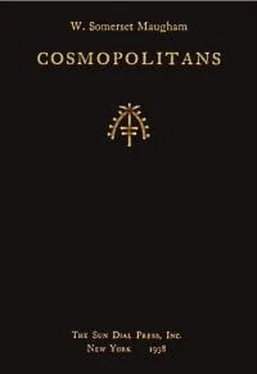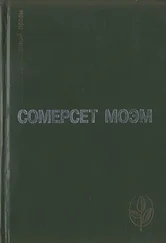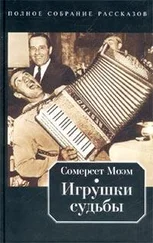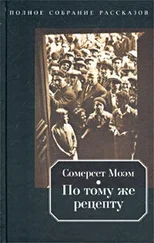Уильям Моэм - Cosmopolitans
Здесь есть возможность читать онлайн «Уильям Моэм - Cosmopolitans» весь текст электронной книги совершенно бесплатно (целиком полную версию без сокращений). В некоторых случаях можно слушать аудио, скачать через торрент в формате fb2 и присутствует краткое содержание. Город: New York, Год выпуска: 1938, Издательство: The Sun Dial Press, INC., Жанр: Классическая проза, short_story, на английском языке. Описание произведения, (предисловие) а так же отзывы посетителей доступны на портале библиотеки ЛибКат.
- Название:Cosmopolitans
- Автор:
- Издательство:The Sun Dial Press, INC.
- Жанр:
- Год:1938
- Город:New York
- ISBN:нет данных
- Рейтинг книги:5 / 5. Голосов: 1
-
Избранное:Добавить в избранное
- Отзывы:
-
Ваша оценка:
- 100
- 1
- 2
- 3
- 4
- 5
Cosmopolitans: краткое содержание, описание и аннотация
Предлагаем к чтению аннотацию, описание, краткое содержание или предисловие (зависит от того, что написал сам автор книги «Cosmopolitans»). Если вы не нашли необходимую информацию о книге — напишите в комментариях, мы постараемся отыскать её.
Cosmopolitans — читать онлайн бесплатно полную книгу (весь текст) целиком
Ниже представлен текст книги, разбитый по страницам. Система сохранения места последней прочитанной страницы, позволяет с удобством читать онлайн бесплатно книгу «Cosmopolitans», без необходимости каждый раз заново искать на чём Вы остановились. Поставьте закладку, и сможете в любой момент перейти на страницу, на которой закончили чтение.
Интервал:
Закладка:
“We can’t go on like this,” Mary cried. “It’s ruining his life. It’s ruining all our lives.”
“Why don’t you take the plunge?”
“What do you mean?”
“You’ve been lovers so long, you know the best and the worst of one another by now; you’re getting old and you can’t count on many more years of life; it seems a pity to waste a love that has endured so long. What good are you doing to Mrs Manson or to Tom? Are they happy because you two are making yourselves miserable?”
“No.”
“Then why don’t you chuck everything and just go off together and let come what may?”
Mary shook her head.
“We’ve talked that over endlessly. We’ve talked it over for a quarter of a century. It’s impossible. For years Gerrard couldn’t on account of his daughters. Mrs Manson may have been a very fond mother, but she was a very bad one, and there was no one to see the girls were properly brought up but Gerrard. And now that they’re married off he’s set in his habits. What should we do? Go to France or Italy? I couldn’t tear Gerrard away from his surroundings. He’d be wretched. He’s too old to make a fresh start. And besides, though Thomas nags me and makes scenes and we frip and get on one another’s nerves, he loves me. When it came to the point I simply shouldn’t have the heart to leave him. He’d be lost without me.”
“It’s a situation without an issue. I’m dreadfully sorry for you.”
On a sudden Mary’s haggard, weather-beaten face was lit by a smile that broke on her large red mouth; and upon my word at that moment she was beautiful.
“You need not be. I was rather low a little while ago, but now I’ve had a good cry I feel better. Notwithstanding all the pain, all the unhappiness this affair has caused me, I wouldn’t have missed it for all the world. For those few moments of ecstasy my love has brought me I would be willing to live all my life over again. And I think he’d tell you the same thing. Oh, it’s been so infinitely worth while.”
I could not help but be moved.
“There’s no doubt about it,” I said. “That’s love all right.”
“Yes, it’s love, and we’ve just got to go through with it. There’s no way out.”
And now with this tragic suddenness the way out had come. I turned a little to look at Mary and she, feeling my eyes upon her, turned too. There was a smile on her lips.
“Why did you come here tonight? It must be awful for you.”
She shrugged her shoulders.
“What could I do? I read the news in the evening paper while I was dressing. He’d asked me not to ring up the nursing-home on account of his wife. It’s death to me. Death. I had to come. We’d been engaged for a month. What excuse could I give Tom? I’m not supposed to have seen Gerrard for two years. Do you know that for twenty years we’ve written to one another every day?” Her lower lip trembled a little, but she bit it and for a moment her face was twisted to a strange grimace; then with a smile she pulled herself together. “He was everything I had in the world, but I couldn’t let the party down, could I? He always said I had a social sense.”
“Happily we shall break up early and you can go home.”
“I don’t want to go home. I don’t want to be alone. I daren’t cry because my eyes will get red and swollen, and we’ve got a lot of people lunching with us tomorrow. Will you come, by the way? I want an extra man. I must be in good form; Tom expects to get a commission for a portrait out of it.”
“By George, you’ve got courage.”
“D’you think so? I’m heartbroken, you know. I suppose that’s what makes it easier for me. Gerrard would have liked me to put a good face on it. He would have appreciated the irony of the situation. It’s the sort of thing he always thought the French novelists described so well.”
The Four Dutchmen
THE VAN Dorth Hotel at Singapore was far from grand. The bedrooms were dingy and the mosquito nets patched and darned; the bath-houses, all in a row and detached from the bedrooms, were dank and smelly. But it had character. The people who stayed there, masters of tramps whose round ended at Singapore, mining engineers out of a job, and planters taking a holiday, to my mind bore a more romantic air than the smart folk, globe-trotters, government officials and their wives, wealthy merchants, who gave luncheon-parties at the Europe and played golf and danced and were fashionable. The Van Dorth had a billiard-room, with a table with a threadbare cloth, where ships’ engineers and clerks in insurance offices played snooker. The dining-room was large and bare and silent. Dutch families on the way to Sumatra ate solidly through their dinner without exchanging a word with one another, and single gentlemen on a business trip from Batavia devoured a copious meal while they intently read their paper. On two days a week there was rijstafel and then a few residents of Singapore who had a fancy for this dish came for tiffin. The Van Dorth Hotel should have been a depressing place, but somehow it wasn’t; its quaintness saved it. It had a faint aroma of something strange and half-forgotten. There was a scrap of garden facing the street where you could sit in the shade of trees and drink cold beer. In that crowded and busy city, though motors whizzed past and rickshaws passed continuously, the coolies’ feet pattering on the road and their bells ringing, it had the remote peacefulness of a corner of Holland. It was the third time I had stayed at the Van Dorth. I had been told about it first by the skipper of a Dutch tramp, the S.S. Utrecht, on which I had travelled from Merauke in New Guinea to Macassar. The journey took the best part of a month, since the ship stopped at a number of islands in the Malay Archipelago, the Aru and the Kei Islands, Banda-Neira, Amboina, and others of which I have even forgotten the names, sometimes for an hour or two, sometimes for a day, to take on or discharge cargo. It was a charming, monotonous and diverting trip. When we dropped anchor, the agent came out in his launch, and generally the Dutch Resident, and we gathered on deck under the awning and the captain ordered beer. The news of the island was exchanged for the news of the world. We brought papers and mail. If we were staying long enough the Resident asked us to dinner and, leaving the ship in charge of the second officer, we all (the captain, the chief officer, the engineer, the supercargo, and I) piled into the launch and went ashore. We spent a merry evening. These little islands, one so like another, allured my fancy just because I knew that I should never see them again. It made them strangely unreal, and as we sailed away and they vanished into the sea and sky it was only by an effort of the imagination that I could persuade myself that they did not with my last glimpse of them cease to exist.
But there was nothing illusive, mysterious, or fantastic about the captain, the chief officer, the chief engineer, and the supercargo. Their solidity was amazing. They were the four fattest men I ever saw. At first I had great difficulty in telling them apart, for though one, the supercargo, was dark and the others were fair, they looked astonishingly alike. They were all big, with large round bare red faces, with large fat arms and large fat legs and large fat bellies. When they went ashore they buttoned up their stengah-shifters and then their great double chins bulged over the collars and they looked as though they would choke. But generally they wore them unbuttoned. They sweated freely and wiped their shiny faces with bandanas and vigorously fanned themselves with palm-leaf fans.
It was a treat to see them at tiffin. Their appetites were enormous. They had rijstafel every day, and each seemed to vie with the other how high he could pile his plate. They loved it hot and strong.
Читать дальшеИнтервал:
Закладка:
Похожие книги на «Cosmopolitans»
Представляем Вашему вниманию похожие книги на «Cosmopolitans» списком для выбора. Мы отобрали схожую по названию и смыслу литературу в надежде предоставить читателям больше вариантов отыскать новые, интересные, ещё непрочитанные произведения.
Обсуждение, отзывы о книге «Cosmopolitans» и просто собственные мнения читателей. Оставьте ваши комментарии, напишите, что Вы думаете о произведении, его смысле или главных героях. Укажите что конкретно понравилось, а что нет, и почему Вы так считаете.










